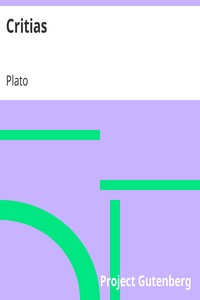Critias by Plato
"Critias" by Plato is a dialogue written in ancient Greece that recounts the legendary story of Atlantis, a mighty island kingdom that attempted to conquer Athens. Through the character Critias, Plato describes how the gods divided the ancient Earth and how early Athens embodied an ideal civilization of virtue and moderation. The dialogue contrasts a good city with one corrupted by ambition, exploring themes of divine justice and societal decline. Part of
an unfinished trilogy, the work ends abruptly, leaving Atlantis's fate tantalizingly incomplete. (This is an automatically generated summary.)
Read or download for free
| How to read | Url | Size | |||
|---|---|---|---|---|---|
| Read now! | https://www.gutenberg.org/ebooks/1571.html.images | 86 kB | |||
| EPUB3 (E-readers incl. Send-to-Kindle) | https://www.gutenberg.org/ebooks/1571.epub3.images | 79 kB | |||
| EPUB (older E-readers) | https://www.gutenberg.org/ebooks/1571.epub.images | 79 kB | |||
| Kindle | https://www.gutenberg.org/ebooks/1571.kf8.images | 131 kB | |||
| older Kindles | https://www.gutenberg.org/ebooks/1571.kindle.images | 123 kB | |||
| Plain Text UTF-8 | https://www.gutenberg.org/ebooks/1571.txt.utf-8 | 74 kB | |||
| Download HTML (zip) | https://www.gutenberg.org/cache/epub/1571/pg1571-h.zip | 76 kB | |||
| There may be more files related to this item. | |||||
Similar Books
About this eBook
| Author | Plato, 428? BCE-348? BCE |
|---|---|
| Translator | Jowett, Benjamin, 1817-1893 |
| Title | Critias |
| Note | Wikipedia page about this book: en.wikipedia.org/wiki/Critias_(dialogue) |
| Credits | Produced by Sue Asscher, and David Widger |
| Reading Level | Reading ease score: 49.8 (College-level). Difficult to read. |
| Language | English |
| LoC Class | PA: Language and Literatures: Classical Languages and Literature |
| Subject | Classical literature |
| Category | Text |
| EBook-No. | 1571 |
| Release Date | Dec 1, 1998 |
| Most Recently Updated | Jan 16, 2013 |
| Copyright Status | Public domain in the USA. |
| Downloads | 2151 downloads in the last 30 days. |
| Project Gutenberg eBooks are always free! | |

